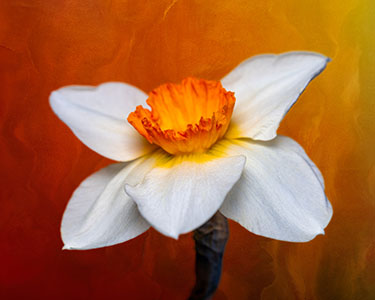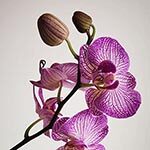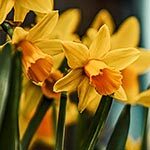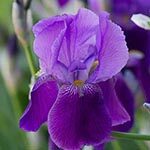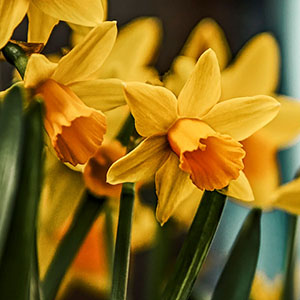
Daffodils Meaning
Ancient Mythology, Redeeming Hope & New Beginnings
Daffodils meaning is steeped in ancient mythology and practical observations. As one of the the first flowers of spring, daffodils bring hope and new beginnings. The end of the winter is near and good fortune lies ahead! Accordingly, daffodils symbolize rebirth. The advent of spring also brings the promise of prosperity.
Share this page with a friend!
Daffodils in the Language of Flowers
In the Victorian language of flowers, daffodil symbolism includes regard, unrequited love, chivalry, sunshine, prosperity, and respect. Poetically speaking, the message of daffodils is “the sun shines when I’m with you.” In terms of cultivation, daffodils are grown prolifically in England and the Netherlands. Cornwall in England is the world’s largest producer of daffodils, growing over 30 tons of daffodils each year.
Daffodils Meaning and Wales
Daffodils are the national flower of Wales. Daffodils meaning in Wales is connected to Saint David, the patron saint of Wales. St David’s Day is celebrated on March 1st. Saint David lived in the 6th century. He was the founder of a monastery in west Wales. The beautiful St David’s Cathedral is now located on this spot.
Daffodils Meaning in Greek Mythology
In Greek mythology, the daffodil is described as a pale yellow deathless lily. The daffodil overspreads the plains of Hades and is the favorite food of the dead.
Origin of the Name Daffodils
Daffodils are also known by the name narcissus, derived from a well-known Greek myth. As the legend goes, the gods had granted good looks to the immortal youth Narcissus. However, if he ever saw his own reflection, he would be destroyed.
A Nymph Falls in Love with Narcissus
At one point, Narcissus was hunting in the forest. A wood nymph saw him from her hiding place behind a tree. She fell madly in love with him. Narcissus, however, was interested only in himself. The nymph longed for him so completely that she wept loudly at his rejection. Eventually she pined away completely and was consumed by her love. All that was left was her name: Echo.
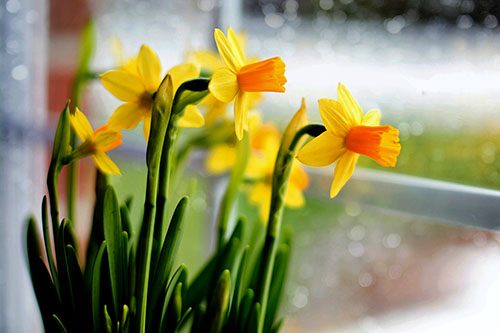
Revenge on Narcissus
A goddess named Nemesis took pity on poor Echo. She set out for revenge against Narcissus on Echo’s behalf. As her plan unfolded, Nemesis lured Narcissus to a beautiful lake. She knew that in his vanity he would not be able to resist looking at himself.
Naming of the Flower
As Narcissus gazed upon himself, he fell in love and the divine penalty was exacted. Some versions of the story say that he fell into the lake and drowned. Others say that he simply faded away. In his place a flower sprang forth, which now bears his name.
The Poet’s Daffodil
The particular daffodil associated with this myth is The Poet’s Daffodil, a wild daffodil that grows in southern Europe. This daffodil has white petals and a small yellow cup tinged in red.
Daffodils for Chinese New Year
The white and yellow flowers of narcissus symbolize gold, silver and wealth in China. They also mean good luck. Their early blooms are associated with the Lunar New Year. They may also be kept indoors during the winter.
Growing Daffodils in China
Narcissus have been grown in China since around 600AD. A number of families began to cultivate varieties of narcissus for sale. During the cultural revolution, narcissus were destroyed as a useless plant. Over the course of the last few decades, daffodils are being grown again and have been successful at flower exhibitions in Shanghai and Taiwan.
Daffodils Meaning in Poetry
The beautiful poem, I Wandered Lonely as a Cloud by William Wordsworth was in inspired by a walk with the poet’s sister Dorothy in April of 1802. They came across a vast array of daffodils as they wandered in the forest. The poem was published in 1815 and became one of Wordsworth’s most beloved verses.
I Wandered Lonely as a Cloud
Daffodils Meaning and Botanical Origins
Daffodils are sometimes called Trumpet Narcissus due to the trumpet-shaped flowers. The English name is derived from the Latin “asphodelus” and from the Greek “asphodelos.” Daffodils are also known as Jonquils from the Latin juncus, meaning “rush.”
Heralds of Spring
These beautiful heralds of spring have also been called the Lent Lily. This is because daffodils bloom close to Ash Wednesday, the beginning of Lent in the Catholic church. They have a fairly short blooming season and generally die before Easter Sunday.
Daffodils and the Romans
Daffodils are originally native to northern Europe. The Roman army is thought to be responsible for introducing daffodils to Northern Europe and Britain. Roman apothecaries believed that daffodils had medicinal properties, carrying daffodil bulbs in their supplies to plant wherever the army was stationed.
Medicinal Uses of Daffodils
Early medical texts include daffodil recipes for treating anything from cuts and bruises to digestive problems. However, daffodils are actually highly toxic to both people and animals. All parts of the daffodil contain lycorine, a toxic chemical that can cause nausea, stomach pain and vomiting.
Caution Around Daffodil Bulbs
Daffodil bulbs contain oxalate crystals that are irritating to the skin and even more damaging when ingested. In addition, flower pickers and florists will commonly develop a “flower rash” from contact with the plants.
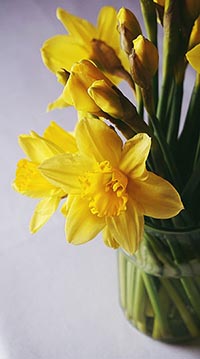
Daffodils Meaning and Flower Color
Due to their popularity, many varieties of daffodils have been developed. Daffodil flowers bloom now in temperate climates around the world. In addition to the classic yellow form, the trumpet and petals may themselves be of contrasting yellow, white, pink, red or orange. Breeders have also developed some daffodils with double, triple, or ambiguously multiple rows of petals, and several wild species also have known double variants.
Yellow flowers are the heralds of spring. Sunshine yellow flowers symbolize the clearing away of the winter and stimulate clear thinking. Well-known yellow flowers include daffodils, crocus, irises, daylilies, coneflowers, dandelions and chrysanthemums. The color meanings of yellow are enthusiasm, cheerfulness, sense of humor, fun, optimism and intellectuality.
White flowers symbolize purity, contemplation and innocence. Many night-flowering plants are white, symbolizing the feminine energies of the moon. White flowers include narcissus, daylilies, gardenias, alyssum and baby’s breath. Use white to give breathing space in your garden from the intensity of bright colors demanding attention. White means purity, inner illumination and spirituality.
Pink flowers symbolize love and healing from grief, anxiety or emotional trauma. A rose garden is the quintessential pink garden. Other pink flowers include chrysanthemums, daffodils, irises, daylilies, camellias, azaleas, carnations, peonies and dahlias. Pink is related to warmth and love, gentleness, beauty, and an outward orientation.
Red flowers are stimulating and eye-catching. The intensity of red flowers creates movement and drama. Accordingly, bright red flowers symbolize cheerfulness and happiness. Red flowers include poppies, poinsettias, daylilies, daffodils, tulips, pansies and zinnias. These flowers all come in various “warm” colors: red, orange and yellow.
Orange flowers raise the spirits and reflect the joy of sunshine. Cheerful orange flowers symbolize warmth, fire, energy and vitality. Common orange flowers include marigolds, daylilies, nasturtiums, daffodils and calendula. The flower color meanings for orange are creativity, confidence, intuition, friendliness and the entrepreneurial spirit.
Daffodils Meaning and Birth Months
Daffodils are the birth flower for those who come into the world in March. This, of course, it totally appropriate as they announce the spring with their bright blooms. Daffodils are also the flower associated with the 10th wedding anniversary.
More Flower Articles
DAFFODILS MEANING ARTICLE SUMMARY
This article features daffodils meaning from the days of Greek mythology to the modern era. Discover what daffodils symbolize in legends, poetry and national pride. Learn about the colors of daffodils and popular daffodils meanings today. Includes beautiful photos and links to additional references.
Author Kathleen Karlsen
Kathleen Karlsen is a musician, artist, writer and speaker. She is the author of two books (Flower Symbols and Vocal Medicine) and over 200 articles. Kathleen, her husband Andrew, and their five children live in Bozeman, Montana. More about Kathleen Karlsen.


